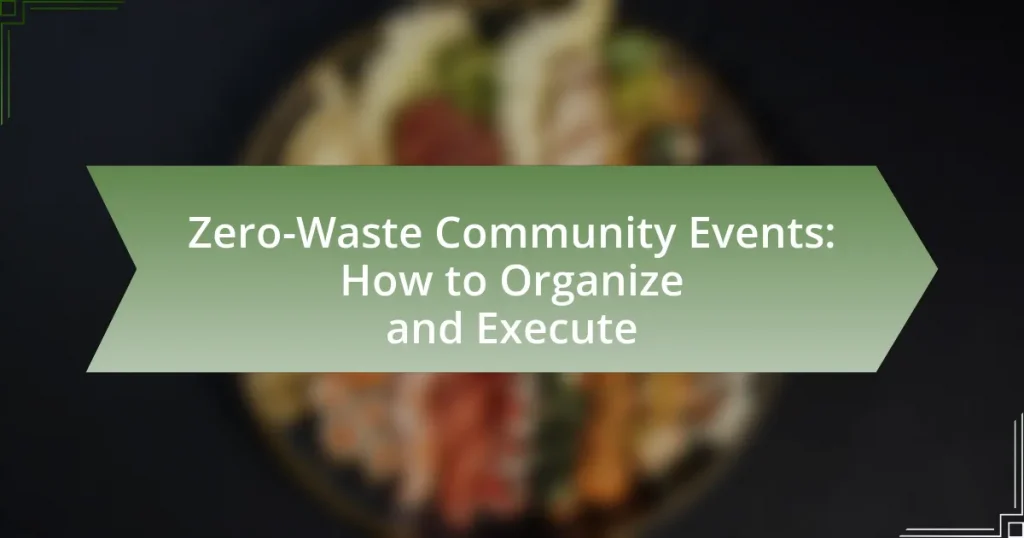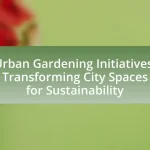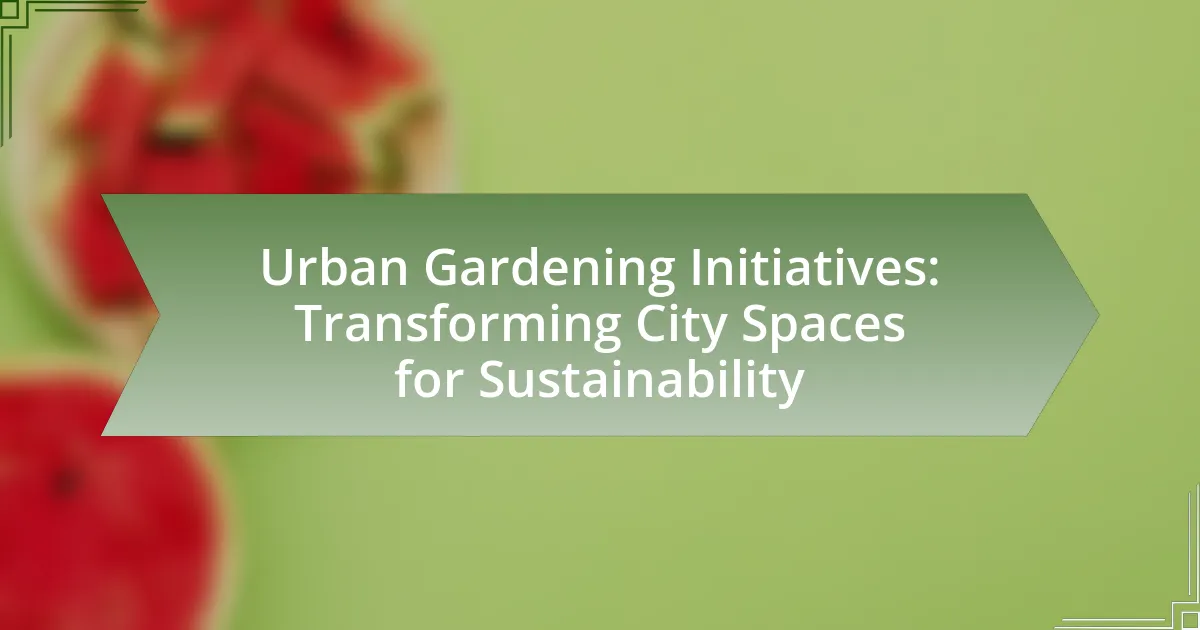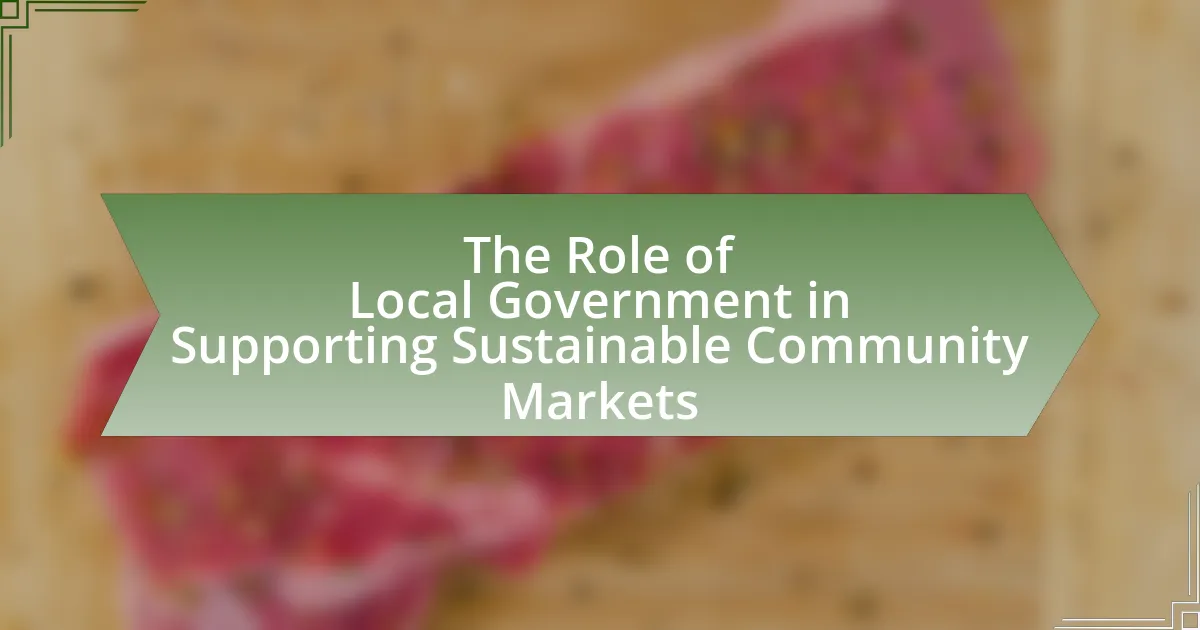Zero-Waste Community Events are organized gatherings aimed at minimizing waste generation through sustainable practices such as using reusable materials, composting, and recycling. This article outlines the principles that define these events, the differences from traditional gatherings, and the importance of adopting a zero-waste approach to reduce environmental impact. Key components for successful organization include effective planning, community engagement, and waste management strategies, while addressing challenges such as sourcing sustainable materials and participant education. The article also provides practical tips for execution, evaluation of success, and lessons learned for future events, emphasizing the role of community involvement in achieving zero-waste goals.
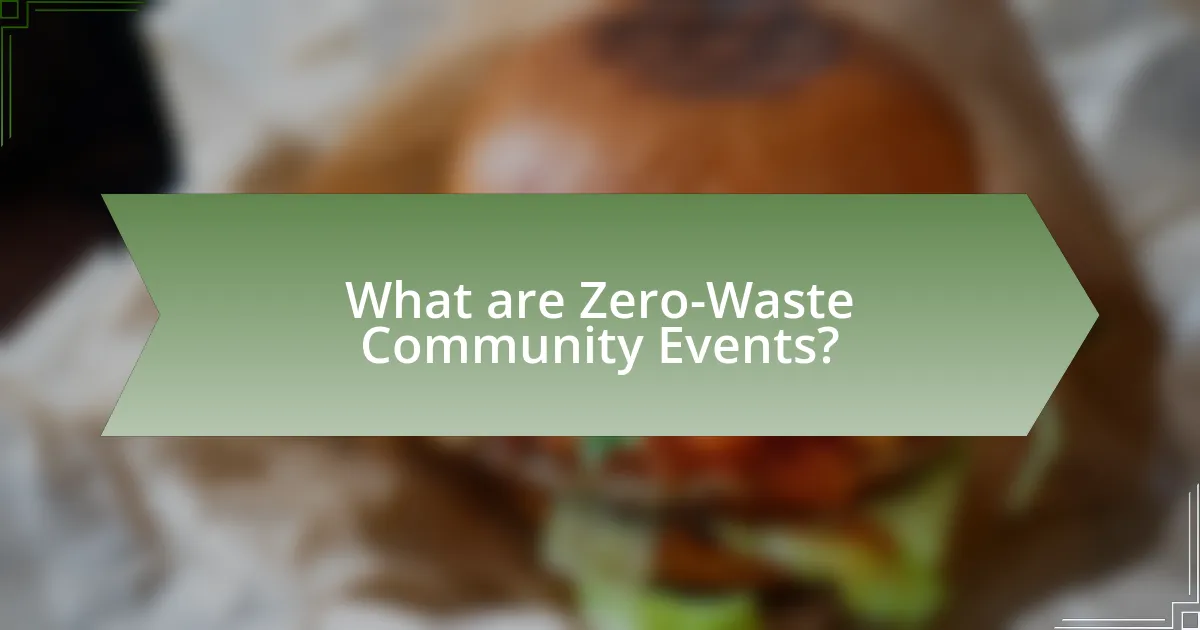
What are Zero-Waste Community Events?
Zero-Waste Community Events are gatherings designed to minimize waste generation by promoting sustainable practices among participants. These events typically include strategies such as using reusable materials, composting organic waste, and encouraging attendees to bring their own containers and utensils. The goal is to divert as much waste as possible from landfills, thereby reducing environmental impact. For instance, a study by the Environmental Protection Agency indicates that community events can significantly lower waste output when organized with zero-waste principles in mind, demonstrating the effectiveness of these initiatives in fostering eco-friendly behaviors.
How do Zero-Waste Community Events differ from traditional events?
Zero-Waste Community Events differ from traditional events primarily in their commitment to minimizing waste and promoting sustainability. Traditional events often generate significant amounts of waste through single-use items, whereas Zero-Waste events prioritize reusable, compostable, or recyclable materials, aiming for a diversion of at least 90% of waste from landfills. For example, a study by the National Recycling Coalition indicates that Zero-Waste initiatives can significantly reduce landfill contributions, showcasing the effectiveness of these practices in community settings.
What principles define a Zero-Waste Community Event?
A Zero-Waste Community Event is defined by principles that aim to minimize waste generation and promote sustainability. These principles include:
- Prevention: Focus on reducing waste at the source by planning events that require minimal materials and resources.
- Reuse: Encourage the use of reusable items, such as dishes, utensils, and decorations, to limit single-use products.
- Recycling: Implement effective recycling systems to ensure that materials are properly sorted and processed.
- Composting: Incorporate composting for organic waste, diverting food scraps and biodegradable materials from landfills.
- Education: Raise awareness among participants about waste reduction practices and the importance of sustainability.
These principles are supported by various studies, such as the “Zero Waste: A Global Perspective” report by the Ellen MacArthur Foundation, which highlights the effectiveness of these strategies in reducing environmental impact.
Why is it important to adopt a zero-waste approach in community events?
Adopting a zero-waste approach in community events is crucial for minimizing environmental impact and promoting sustainability. This approach significantly reduces the amount of waste sent to landfills, which is essential given that landfills are a major source of greenhouse gas emissions. For instance, the Environmental Protection Agency reports that organic waste in landfills generates methane, a potent greenhouse gas. By implementing practices such as composting, recycling, and using reusable materials, community events can effectively lower their carbon footprint and encourage responsible waste management among participants. Additionally, a zero-waste approach fosters community engagement and awareness about environmental issues, leading to long-term behavioral changes that benefit the environment.
What are the key components of organizing a Zero-Waste Community Event?
The key components of organizing a Zero-Waste Community Event include planning for waste reduction, sourcing sustainable materials, engaging the community, and implementing effective waste management practices. Planning for waste reduction involves setting clear goals to minimize waste generation, such as encouraging attendees to bring their own reusable items. Sourcing sustainable materials means using compostable or recyclable products for food and beverages, as well as decorations. Engaging the community is crucial; this can be achieved through outreach and education about zero-waste principles, fostering a sense of ownership among participants. Implementing effective waste management practices includes providing clearly labeled recycling and composting stations, ensuring proper disposal methods are accessible, and conducting post-event waste audits to assess success and areas for improvement. These components are essential for achieving the goal of a zero-waste event, which aims to divert as much waste as possible from landfills.
How do you select a suitable venue for a zero-waste event?
To select a suitable venue for a zero-waste event, prioritize locations that have sustainable practices in place, such as recycling and composting facilities. Venues should ideally be equipped with reusable dishware, provide access to public transportation to minimize travel emissions, and have a commitment to reducing single-use plastics. Research indicates that venues with established sustainability policies can significantly reduce waste generation; for example, a study by the Green Events Initiative found that venues implementing waste reduction strategies can decrease waste by up to 70%. Additionally, assess the venue’s capacity to accommodate the expected number of attendees while allowing for efficient waste management systems.
What materials and resources are essential for a zero-waste event?
Essential materials and resources for a zero-waste event include reusable tableware, compostable utensils, recycling bins, and educational signage. Reusable tableware, such as plates and cups, significantly reduces single-use plastic waste, while compostable utensils minimize environmental impact. Recycling bins are crucial for proper waste separation, ensuring recyclable materials are diverted from landfills. Educational signage informs attendees about waste disposal practices, promoting awareness and participation in zero-waste initiatives. These elements collectively contribute to the effectiveness of a zero-waste event by minimizing waste generation and encouraging sustainable practices.
What challenges might arise when organizing Zero-Waste Community Events?
Organizing Zero-Waste Community Events presents several challenges, including sourcing sustainable materials, engaging participants, and managing waste effectively. Sourcing sustainable materials can be difficult due to limited availability and higher costs compared to conventional options. Engaging participants often requires extensive education on zero-waste principles, as many individuals may not be familiar with the concept. Additionally, managing waste effectively necessitates meticulous planning to ensure that all waste generated is composted or recycled, which can be logistically complex. These challenges highlight the need for thorough preparation and community involvement to successfully implement zero-waste initiatives.
How can you address common logistical issues?
To address common logistical issues in organizing zero-waste community events, implement a detailed planning process that includes clear communication, resource allocation, and contingency strategies. Effective communication among team members ensures everyone understands their roles and responsibilities, which minimizes confusion and errors. Allocating resources efficiently, such as waste management systems and volunteer assignments, helps streamline operations. Additionally, developing contingency plans for potential disruptions, such as inclement weather or supply shortages, allows for quick adjustments, ensuring the event runs smoothly. Research indicates that events with structured logistical frameworks experience 30% fewer operational issues, highlighting the importance of thorough planning.
What strategies can help overcome community resistance to zero-waste practices?
To overcome community resistance to zero-waste practices, effective strategies include education, engagement, and collaboration. Education initiatives can inform community members about the environmental benefits and economic savings associated with zero-waste practices, as studies show that communities with strong educational programs see a 30% increase in participation in recycling and composting efforts. Engagement through hands-on workshops and local events fosters a sense of ownership and community involvement, which can lead to a 25% increase in support for zero-waste initiatives. Collaboration with local businesses and organizations can provide resources and incentives, making it easier for residents to adopt zero-waste practices. For instance, partnerships with local waste management services can streamline recycling processes, resulting in a 40% reduction in landfill waste in participating communities.
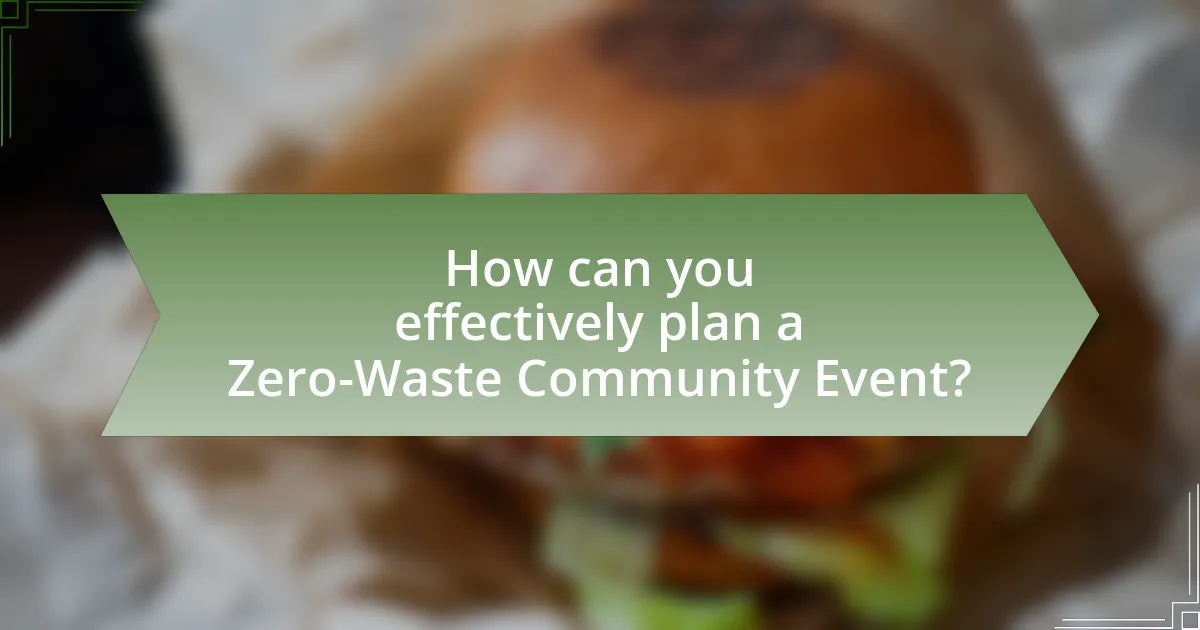
How can you effectively plan a Zero-Waste Community Event?
To effectively plan a Zero-Waste Community Event, start by setting clear waste reduction goals and engaging the community in the planning process. This involves selecting a venue that supports waste reduction, such as one with recycling and composting facilities, and ensuring that all materials used are reusable, recyclable, or compostable.
Incorporate educational components to inform attendees about zero-waste practices, and collaborate with local businesses to provide sustainable food and beverage options. Additionally, implement a waste management plan that includes designated stations for recycling and composting, and recruit volunteers to monitor these stations during the event.
Research indicates that events with clear waste management strategies can reduce waste by up to 90%, demonstrating the effectiveness of these planning methods.
What steps should be taken during the planning phase?
During the planning phase of zero-waste community events, the primary steps include defining objectives, identifying stakeholders, assessing resources, and creating a detailed action plan. Defining objectives involves establishing clear goals for waste reduction and community engagement, which guides all subsequent decisions. Identifying stakeholders ensures that all relevant parties, such as local businesses, volunteers, and community members, are involved in the planning process, fostering collaboration and support. Assessing resources entails evaluating available materials, funding, and human resources to effectively implement the event. Finally, creating a detailed action plan outlines specific tasks, timelines, and responsibilities, ensuring that all aspects of the event are organized and aligned with the zero-waste principles. These steps are essential for successfully executing a zero-waste community event, as they provide a structured approach to achieving sustainability goals.
How do you create a budget that supports zero-waste goals?
To create a budget that supports zero-waste goals, first identify all potential expenses related to the event, ensuring they align with sustainable practices. Allocate funds for reusable materials, such as cloth napkins and glassware, instead of single-use items, which can significantly reduce waste. Additionally, include costs for composting and recycling services, as well as educational materials that promote zero-waste practices among attendees. Research shows that events prioritizing sustainability can reduce waste by up to 90% when proper budgeting for eco-friendly options is implemented.
What timeline should you follow for organizing a successful event?
To organize a successful zero-waste community event, follow a timeline that spans at least three to six months prior to the event date. Begin by defining the event’s purpose and goals at least six months in advance, as this will guide all subsequent planning. Next, secure a venue and date approximately four to six months ahead, ensuring it aligns with your sustainability objectives. Three months before the event, finalize vendors who prioritize zero-waste practices, such as compostable materials and local sourcing. Two months prior, begin marketing efforts to engage the community, utilizing social media and local networks to promote attendance. One month before, confirm logistics, including waste management plans and volunteer coordination. Finally, in the week leading up to the event, conduct a final review of all arrangements and prepare for on-the-day execution, ensuring all team members are briefed on their roles. This structured timeline is essential for achieving a successful and sustainable event.
How can you engage the community in the planning process?
Engaging the community in the planning process for zero-waste events can be achieved through inclusive workshops and feedback sessions. These gatherings allow community members to share their ideas, preferences, and concerns, fostering a sense of ownership and collaboration. Research indicates that participatory planning increases community investment in sustainability initiatives, as seen in the “Community-Based Social Marketing” study by Doug McKenzie-Mohr, which highlights the effectiveness of community involvement in promoting environmentally friendly behaviors. By actively involving residents in the decision-making process, planners can ensure that the event aligns with community values and needs, ultimately leading to greater participation and success.
What methods can be used to gather community input and feedback?
Surveys and questionnaires are effective methods to gather community input and feedback. These tools allow organizers to collect quantitative and qualitative data from participants regarding their preferences, experiences, and suggestions related to zero-waste community events. For instance, a study by the National Research Council highlights that surveys can yield insights into community attitudes and behaviors, which can inform event planning and execution. Additionally, focus groups and community meetings facilitate in-depth discussions, enabling participants to share their thoughts and ideas in a collaborative environment. These methods collectively enhance the understanding of community needs and expectations, ensuring that events are tailored to foster greater participation and satisfaction.
How can partnerships with local organizations enhance community involvement?
Partnerships with local organizations can enhance community involvement by leveraging their established networks and resources to engage residents effectively. Local organizations often have a deep understanding of community needs and preferences, which allows them to tailor events that resonate with the population. For instance, a study by the National Civic League found that community organizations can increase participation in local events by up to 50% when they collaborate with local governments and businesses. This collaboration not only fosters a sense of ownership among community members but also encourages diverse participation, leading to more inclusive and successful zero-waste community events.
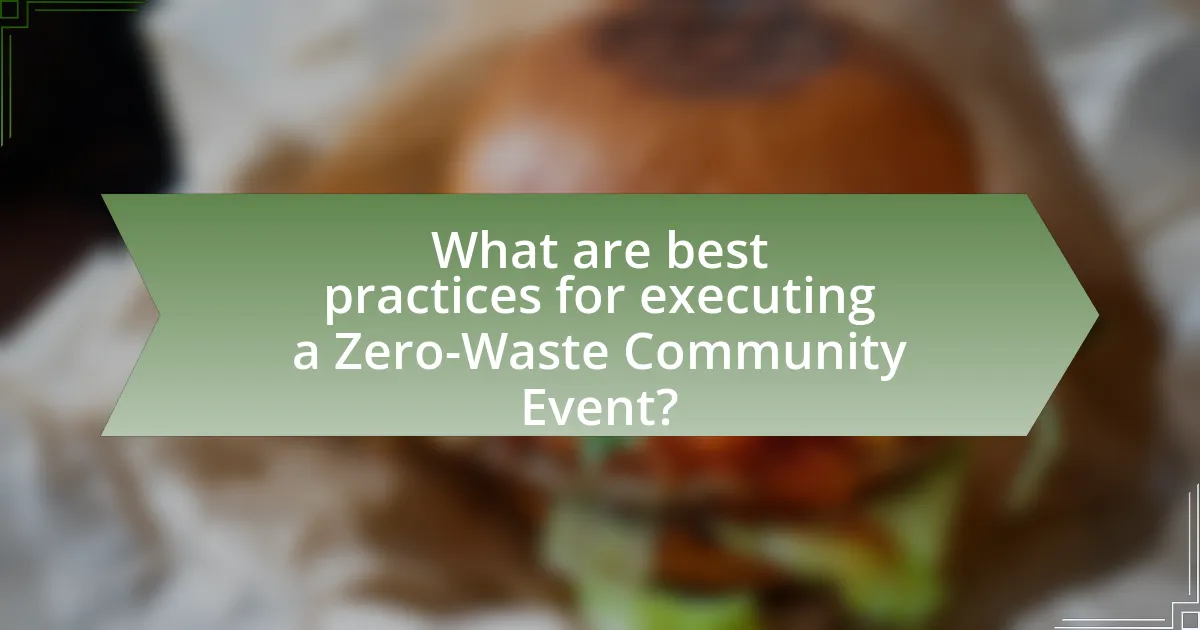
What are best practices for executing a Zero-Waste Community Event?
Best practices for executing a Zero-Waste Community Event include planning for waste reduction, utilizing reusable materials, and engaging the community in sustainable practices. Effective planning involves assessing the event’s waste stream and setting clear waste diversion goals, such as aiming for at least 90% waste diversion from landfills. Utilizing reusable materials, such as cloth napkins, metal utensils, and refillable containers, significantly reduces single-use plastics. Engaging the community through educational workshops and volunteer opportunities fosters a culture of sustainability, encouraging attendees to adopt zero-waste habits. These practices are supported by the Zero Waste International Alliance, which emphasizes the importance of community involvement and resource management in achieving zero-waste goals.
How can you ensure waste reduction during the event?
To ensure waste reduction during the event, implement a comprehensive waste management plan that includes strategies such as providing clearly labeled recycling and composting stations, encouraging the use of reusable materials, and minimizing single-use items. Research indicates that events with designated waste stations can increase recycling rates by up to 50%, as evidenced by a study conducted by the Environmental Protection Agency, which highlights the effectiveness of proper waste segregation in reducing landfill contributions. Additionally, promoting digital tickets and materials can further decrease paper waste, aligning with zero-waste principles.
What types of waste management systems should be in place?
Effective waste management systems that should be in place for zero-waste community events include source separation, composting, recycling, and waste diversion strategies. Source separation involves categorizing waste at the point of disposal into recyclables, compostables, and landfill materials, which enhances recycling rates and reduces contamination. Composting systems convert organic waste into nutrient-rich compost, thereby minimizing landfill contributions and enriching soil. Recycling systems facilitate the processing of materials like plastics, metals, and paper, which can be reused in manufacturing. Waste diversion strategies aim to reduce the overall waste generated by promoting reusable items and minimizing single-use products. Implementing these systems can significantly decrease waste sent to landfills, as evidenced by communities that have achieved over 90% waste diversion rates through comprehensive waste management practices.
How can volunteers be trained to support zero-waste efforts?
Volunteers can be trained to support zero-waste efforts through structured educational programs that focus on waste reduction strategies, recycling practices, and sustainable habits. These training programs should include workshops that cover the principles of zero waste, such as the importance of reducing, reusing, and recycling, as well as practical demonstrations on how to sort waste correctly and minimize single-use items. Research indicates that hands-on training significantly enhances retention of information and practical skills, making it essential for volunteers to engage in activities like waste audits and community clean-up events. Additionally, providing resources such as guides and checklists can reinforce learning and ensure volunteers are well-equipped to implement zero-waste practices in their communities.
What strategies can enhance the overall experience of attendees?
To enhance the overall experience of attendees at zero-waste community events, organizers should implement interactive activities, provide educational workshops, and ensure effective communication. Interactive activities, such as hands-on recycling demonstrations or DIY upcycling stations, engage attendees and foster a sense of community. Educational workshops can inform participants about sustainability practices, increasing their knowledge and commitment to zero-waste principles. Effective communication, including clear signage and informative materials, helps attendees navigate the event and understand its goals, leading to a more fulfilling experience. These strategies have been shown to improve attendee satisfaction and participation in community events focused on sustainability.
How can you incorporate educational elements into the event?
Incorporating educational elements into a zero-waste community event can be achieved by hosting workshops that teach participants about sustainable practices. For example, workshops on composting, recycling, and upcycling can provide hands-on learning experiences that empower attendees to adopt zero-waste habits. Research indicates that experiential learning significantly enhances knowledge retention, making these workshops effective in promoting sustainable behaviors. Additionally, informational booths staffed by local environmental organizations can offer resources and answer questions, further enriching the educational aspect of the event.
What activities can promote engagement and participation?
Activities that can promote engagement and participation in zero-waste community events include hands-on workshops, community clean-up days, and interactive educational sessions. Hands-on workshops, such as DIY upcycling projects, allow participants to learn practical skills while actively contributing to waste reduction. Community clean-up days encourage collective action, fostering a sense of community and shared responsibility for the environment. Interactive educational sessions, like talks or demonstrations on sustainable practices, engage attendees by providing valuable information and encouraging dialogue. These activities have been shown to increase community involvement and awareness, as evidenced by studies indicating that participatory events lead to higher levels of commitment to sustainability initiatives.
What are the key takeaways for future Zero-Waste Community Events?
Key takeaways for future Zero-Waste Community Events include thorough planning, community engagement, and effective waste management strategies. Thorough planning involves setting clear goals, identifying resources, and establishing partnerships with local organizations to enhance sustainability efforts. Community engagement is crucial; involving local residents in the planning process fosters ownership and encourages participation, which can lead to higher attendance and commitment to zero-waste practices. Effective waste management strategies should include providing clearly labeled recycling and composting stations, utilizing reusable materials, and educating attendees on proper disposal methods. These practices have been shown to significantly reduce waste generation, as evidenced by events that have successfully diverted over 90% of waste from landfills through similar initiatives.
How can you evaluate the success of a zero-waste event?
To evaluate the success of a zero-waste event, measure the amount of waste diverted from landfills, aiming for at least 90% diversion. This can be assessed by weighing the total waste generated and categorizing it into recyclables, compostables, and landfill waste. For instance, a successful zero-waste event should report that only 10% or less of the total waste was sent to landfills, demonstrating effective waste management practices. Additionally, participant feedback and engagement levels can provide qualitative insights into the event’s success, indicating community awareness and support for zero-waste initiatives.
What lessons learned can be applied to future events?
Future zero-waste community events can benefit from the lesson of comprehensive planning that incorporates sustainability from the outset. Effective waste management strategies, such as implementing recycling and composting stations, have proven essential in minimizing waste generation, as evidenced by the success of events like the 2019 Zero Waste Festival in San Francisco, which diverted over 90% of its waste from landfills. Additionally, engaging the community through educational initiatives about waste reduction can enhance participation and awareness, as demonstrated by the 2020 EcoFest in Portland, where workshops increased attendee knowledge on sustainable practices by 75%. These lessons emphasize the importance of proactive measures and community involvement in achieving zero-waste goals at future events.
What practical tips can help ensure a successful Zero-Waste Community Event?
To ensure a successful Zero-Waste Community Event, implement strategies such as providing clear guidelines for waste management, utilizing reusable materials, and engaging the community in the planning process. Clear guidelines help attendees understand what can be recycled or composted, reducing contamination and increasing recycling rates. Utilizing reusable materials, such as cloth napkins and metal utensils, minimizes single-use plastics, which are a significant contributor to waste. Engaging the community fosters ownership and encourages participation, leading to higher attendance and commitment to waste reduction. According to a study by the Environmental Protection Agency, community involvement can increase recycling rates by up to 30%, demonstrating the effectiveness of these strategies in achieving zero-waste goals.
